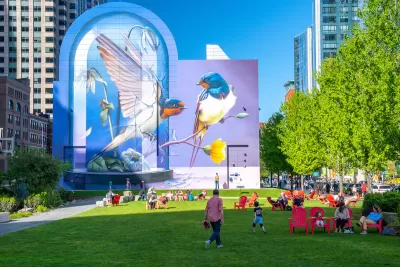The pandemic highlighted the importance of parks and public spaces for maintaining both the physical and mental health of urban residents.

Update November 20, 2023: The source article was incorrectly attributed to Scot Lehigh. the author of the article is Aaron Greiner.
Writing in The Boston Globe, Aaron Greiner argues that “Public spaces, which served as a lifeline for people during the pandemic, can be more thoughtfully designed to better foster human connection and combat loneliness.”
As Greiner points out, “A growing body of research, including a 2021 study that found that frequent visits to green spaces decreased people’s use of depression medication, points to the many ways a dose of public space can improve people’s well-being.” For Greiner, this means planners and city leaders must consciously build places that foster wellbeing and “invite people to stop, stay, and connect.” Greiner calls places that do this successfully—“make people feel welcome, represented, and connected to their neighborhoods, and this, in turn, builds social connections between visitors”—‘sticky.’
Greiner adds that “Social infrastructure, like physical infrastructure, requires upkeep, investment, and adaptation”—and should be similarly prioritized by cities long after the pandemic.
FULL STORY: Urban planners should prioritize community spaces to help combat loneliness

Planetizen Federal Action Tracker
A weekly monitor of how Trump’s orders and actions are impacting planners and planning in America.

Map: Where Senate Republicans Want to Sell Your Public Lands
For public land advocates, the Senate Republicans’ proposal to sell millions of acres of public land in the West is “the biggest fight of their careers.”

Restaurant Patios Were a Pandemic Win — Why Were They so Hard to Keep?
Social distancing requirements and changes in travel patterns prompted cities to pilot new uses for street and sidewalk space. Then it got complicated.

Maui's Vacation Rental Debate Turns Ugly
Verbal attacks, misinformation campaigns and fistfights plague a high-stakes debate to convert thousands of vacation rentals into long-term housing.

San Francisco Suspends Traffic Calming Amidst Record Deaths
Citing “a challenging fiscal landscape,” the city will cease the program on the heels of 42 traffic deaths, including 24 pedestrians.

California Homeless Arrests, Citations Spike After Ruling
An investigation reveals that anti-homeless actions increased up to 500% after Grants Pass v. Johnson — even in cities claiming no policy change.
Urban Design for Planners 1: Software Tools
This six-course series explores essential urban design concepts using open source software and equips planners with the tools they need to participate fully in the urban design process.
Planning for Universal Design
Learn the tools for implementing Universal Design in planning regulations.
Heyer Gruel & Associates PA
JM Goldson LLC
Custer County Colorado
City of Camden Redevelopment Agency
City of Astoria
Transportation Research & Education Center (TREC) at Portland State University
Camden Redevelopment Agency
City of Claremont
Municipality of Princeton (NJ)




























